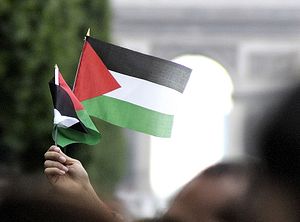On December 21-22, Beijing held the Palestinian-Israeli Peace Symposium, taking on an increased role in managing the Middle East’s biggest headache. China had held two such symposiums in Beijing and Jerusalem in 2006 and 2003, respectively. The latest was the first organized under Chinese President Xi Jinping’s administration.
The symposium included eight delegates from Palestine and Israel, and seven from China, including China’s Special Envoy on the Middle East Issue, Gong Xiaosheng. Member of the Executive Committee of the Palestinian Liberation Organization, Ahmed Majdalani, and Deputy Speaker of the Knesset [the Israeli parliament] and head of the lobby for the two-state solution, Yehiel Bar, led their delegations attending the meeting.
Chinese Foreign Minister Wang Yi met both groups at the Great Hall of the People in Beijing.
During the meeting with the Palestinian representatives, Wang reiterated that “China’s stance is clear and we have always upheld our claim — that is, we support the establishment of an independent Palestinian state that enjoys full sovereignty, with East Jerusalem as its capital and based on the 1967 border.”
On December 22, Gong Xiaosheng held a press briefing in which he explained that China held the meeting in order to “play an active and constructive role in promoting the settlement of the Palestine-Israel issue.”
Gong claimed that during the meeting, both delegations agreed that the “two-state solution” is the only feasible vision and promised to avoid taking unilateral action to harm the realization of this solution.
Most importantly, both sides, according to Gong, believe that, “China, as a major country, could play an important role” and “create conditions for promoting stronger and effective international endeavors in advancing peace talks.” Gong added:
From now on, China will continue paying attention to the Palestine-Israel situation, actively participate in the international community’s endeavors in advancing peace talks and negotiations, support and push forward the peace process in the Middle East and play an active role in advancing the comprehensive, just and lasting settlement of the Palestine-Israel issue at an early date.
The symposium came immediately after the United Nations General Assembly adopted a resolution by a vote of 128 to 9, with 35 abstentions, rejecting U.S. President Donald Trump’s decision to recognize Jerusalem as Israel’s capital. This resolution, although non-binding, says that any decisions regarding the status of the city are “null and void” and must be canceled.
Under the current circumstances, it’s an easy and smart diplomatic move for China to stand against the Trump’s administration together with the majority and loudly call for the “two-state solution.” Even Pope Francis was on China’s side. He recently used his Christmas message to urge a negotiated two-state solution to end the conflict between Israel and Palestine.
According to CGTN, during the Symposium, the Palestinian envoys also delivered a letter from Palestinian President Mahmoud Abbas, which expressed his gratitude for China’s support.
“We appreciate China’s support to us in the United Nations, especially at the Security Council on the 18th and the General Assembly,” Ahmed Majdalani added.

































